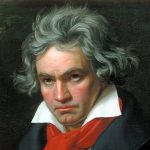Ludwig Van Beethoven and Carl Friedrich Amenda forged a lifelong friendship during his stay in Vienna. Carl Amenda was a Baltic theologian and a violinist. Beethoven dedicated the early version of his string quartet in F major op. 18 No. 1 to Amenda, in 1799. Beethoven first confessed about the loss of his hearing faculties in this letter to Carl Amenda. This letter was published in a collection titled Beethoven’s Letters 1790-1826, Volume 1 of 2. It was translated from German by Lady Grace Wallace in 1866.
1800
My Dear, My Good Amenda, My Warm-Hearted Friend,–
I received and read your last letter with deep emotion, and with mingled pain and pleasure. To what can I compare your fidelity and devotion to me? Ah! it is indeed delightful that you still continue to love me so well. I know how to prize you, and to distinguish you from all others; you are not like my Vienna friends. No! you are one of those whom the soil of my fatherland is wont to bring forth; how often I wish that you were with me, for your Beethoven is very unhappy. You must know that one of my most precious faculties, that of hearing, is become very defective; even while you were still with me I felt indications of this, though I said nothing; but it is now much worse. Whether I shall ever be cured remains yet to be seen; it is supposed to proceed from the state of my digestive organs, but I am almost entirely recovered in that respect. I hope indeed that my hearing may improve, but I scarcely think so, for attacks of this kind are the most incurable of all. How sad my life must now be!–forced to shun all that is most dear and precious to me, and to live with such miserable egotists as —-, &c. I can with truth say that of all my friends Lichnowsky [Prince Carl] is the most genuine. He last year settled 600 florins on me, which, together with the good sale of my works, enables me to live free from care as to my maintenance. All that I now write I can dispose of five times over, and be well paid into the bargain. I have been writing a good deal latterly, and as I hear that you have ordered some pianos from —-, I will send you some of my compositions in the packing-case of one of these instruments, by which means they will not cost you so much.
To my great comfort, a person has returned here with whom I can enjoy the pleasures of society and disinterested friendship,–one of the friends of my youth [Stephan von Breuning]. I have often spoken to him of you, and told him that since I left my fatherland, you are one of those to whom my heart specially clings. Z. [Zmeskall?] does not seem quite to please him; he is, and always will be, too weak for true friendship, and I look on him and —- as mere instruments on which I play as I please, but never can they bear noble testimony to my inner and outward energies, or feel true sympathy with me; I value them only in so far as their services deserve. Oh! how happy should I now be, had I my full sense of hearing; I would then hasten to you; whereas, as it is, I must withdraw from everything. My best years will thus pass away, without effecting what my talents and powers might have enabled me to perform. How melancholy is the resignation in which I must take refuge! I had determined to rise superior to all this, but how is it possible? If in the course of six months my malady be pronounced incurable then, Amenda! I shall appeal to you to leave all else and come to me, when I intend to travel (my affliction is less distressing when playing and composing, and most so in intercourse with others), and you must be my companion. I have a conviction that good fortune will not forsake me, for to what may I not at present aspire? Since you were here I have written everything except operas and church music. You will not, I know, refuse my petition; you will help your friend to bear his burden and his calamity. I have also very much perfected my pianoforte playing, and I hope that a journey of this kind may possibly contribute to your own success in life, and you would thenceforth always remain with me. I duly received all your letters, and though I did not reply to them, you were constantly present with me, and my heart beats as tenderly as ever for you. I beg you will keep the fact of my deafness a profound secret, and not confide it to any human being. Write to me frequently; your letters, however short, console and cheer me; so I shall soon hope to hear from you.
Do not give your quartet to any one [in F, Op. 18, No. 1], as I have altered it very much, having only now succeeded in writing quartets properly; this you will at once perceive when you receive it. Now, farewell, my dear kind friend! If by any chance I can serve you here, I need not say that you have only to command me.
Your faithful and truly attached
L. V. Beethoven
Ludwig Van Beethoven was a prolific writer of letters. stg-thespaceink-tstodaystg.kinsta.coud has chosen to reprint some of his numerous correspondences to friends and patrons.








